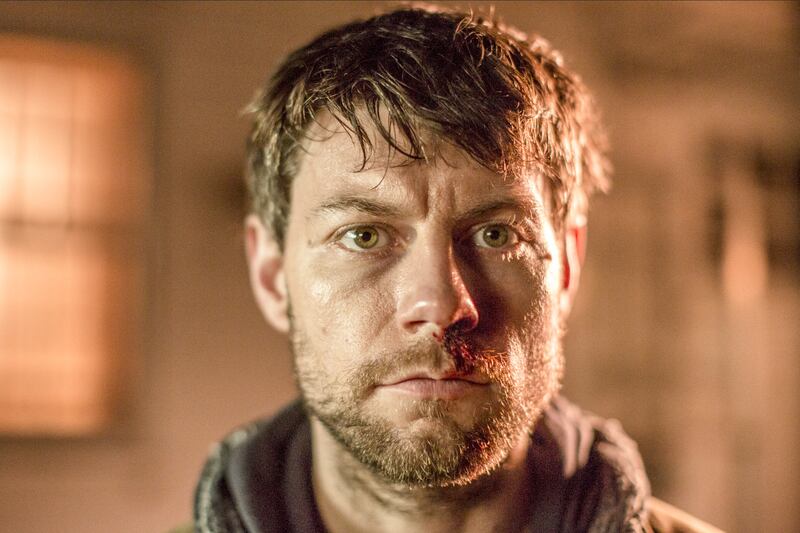The devil is domestic violence in Outcast, a new Cinemax series premiering tonight from Robert Kirkman, the macabre mastermind behind The Walking Dead. For his follow-up to that critically hailed comic (and blockbuster AMC television adaptation), Kirkman remains firmly in supernatural territory—this time, for a story (based on his and artist Paul Azaceta’s comic of the same name, which debuted in 2014) about a rural town beset by demonic possession, and two unlikely allies determined to do something about it.
And yet to a far greater degree than his prior hit, Kirkman’s latest is rooted in a more mundane, human evil: that of the abuse perpetrated against those we supposedly (or are supposed to) love.
On the basis of The Walking Dead and now Outcast, Kirkman has transformed himself into TV’s premiere purveyor of plagues—in the former, a zombie apocalypse; in the latter, a horde of demons who resemble swirling black ink-smoke and assume control of the living for reasons that, at least for now, remain opaque. Over the course of its first four episodes (which is all Cinemax provided critics in advance), the show establishes itself as a portrait of all-too-relatable sins. “Dark forces” may be creeping through the downtrodden country burg of Rome, West Virginia, where houses’ roofs are weighed down and warped by wet leaves, stores are as quiet as they are dusty, and graffiti-loving skate kids loiter around empty parking lots. However, the real threat to the town’s citizens seems to be not only Satan, but those faux-trustworthy individuals who are allowed to enter through the front door, and inhabit parlors, kitchens, and living rooms.
ADVERTISEMENT

The pariah at the center of Outcast is Kyle Barnes (Patrick Fugit), who’s introduced dreaming of a wife (Kate Lyn Sheil) and child that, we soon learn, fled him after a mysterious incident involving abuse. Kyle has returned home to live in isolated squalor in his mom’s ramshackle abode, where (as flashbacks reveal) he was routinely preyed upon by the woman—dragged around by the hair, and locked away in a pantry closet where he’d scrawl drawings on the wall—because she was possessed by a malevolent spirit.
How she came to be that way isn’t explained in episode one. Yet it’s clear she isn’t Rome’s only victim of Beelzebubian manipulation from the series’ chilling opener, in which a young boy stares open-mouthed at a bug on his bedroom wall—and then crushes it with his forehead, smearing its blood over his face before chomping into it with unnatural viciousness.
Outcast’s maiden chapter (available to stream, for free, online https://cinemax.outcasttvseries.com/watch-the-pilot-for-free-now/) is helmed by Adam Wingard, one of American cinema’s most promising horror directors responsible for 2011’s slasher-ish You’re Next, 2014’s John Carpenter-style thriller The Guest, and this fall’s buzz-worthy The Wood. Wingard’s precise compositions capture the raw, damp, gone-to-seed decay of his West Virginia milieu. Moreover, they evoke an atmosphere of desperation and desolation in tune with his characters, all of whom are trying to cope with, and overcome, the cloud of brutality and misery hovering just overhead.
Before long, Kirkman has paired Kyle with his former foster sister Megan (Boardwalk Empire’s Wrenn Schmidt), who strives to care for him despite the fact that her cop husband Mark (The Office’s David Denman) despises him, as well as Reverend Anderson (Philip Glenister), a preacher with a habit of cursing—including taking the Lord’s name in vain when it suits him—and a track record of performing exorcisms to free innocents from Satan’s sinister grip.
Thanks to a confluence of events culminating with the revelation that Kyle’s blood has the power to expel demons from their hosts—a discovery that may explain how he “saved” his mother, who’s now a nursing-home vegetable—Kyle and Anderson soon become reluctant partners driven to pursue a new spate of demonic possession cases. In their storylines, as well as in Kyle’s flashbacks and an additional narrative strand involving Megan confronting a former foster brother who molested her years earlier, the unholy is found in the comfortable, seemingly safe confines of the suburban home. In Kirkman’s chilling worldview, terrors are something located within—be it with regards to one’s body, soul, residence or mind, the last of which becomes the true source of pain for Kyle, Anderson and Megan as they grapple with both present crises and inescapable memories of past traumas.
After a sterling first installment, Outcast—enhanced by a foreboding industrial score by Atticus Ross (Trent Reznor’s NIN producer, and contributor on The Social Network and Gone Girl)—slows down its pace and more evenly divides its time between various points of interest. Those include not only Megan and Mark, but also police chief Giles (terrific character actor Reg E. Cathey), who soon finds himself investigating a strange camper near a raft of crucified forest animals that may be the scene of an acquaintance’s crimes.
In its second and third episodes, the material periodically drags to a crawl while laying the bedrock foundation for forthcoming action. And its habit of leaving key details and interpersonal dynamics vague borders on irritating. Though it resumes building momentum by the end of its fourth chapter, there’s a sense that the show requires somewhat more vigorous storytelling, lest it potentially fall victim to the mounting peak-TV epidemic of skimping on compelling episode-to-episode plot in order to encourage binge-watching bulk sessions.
In a turn that’s far removed from his cheerily naïve Almost Famous breakout performance, Fugit embodies Kyle with haunted self-doubt and insecurity as a man struggling to comprehend the world’s, and his own, capacity for cruelty. And Glenister, an English actor best known for his UK small-screen work, strikes a uniquely no-nonsense, rough-around-the-edges chord as Anderson, a true believer whose faith requires no decorous delicacy. In horror-maestro Kirkman’s assured hands, they’re an intriguing duo beset by abusive evils both internal and external—and ones that, as the show tantalizingly suggests, are all too often embraced, nurtured, and propagated like a homemade virus by those nearest and dearest to us.





